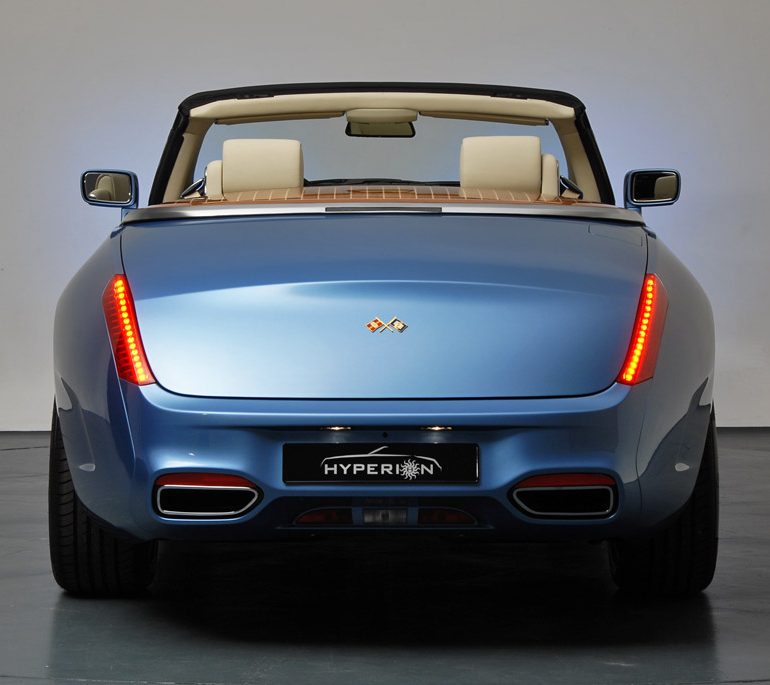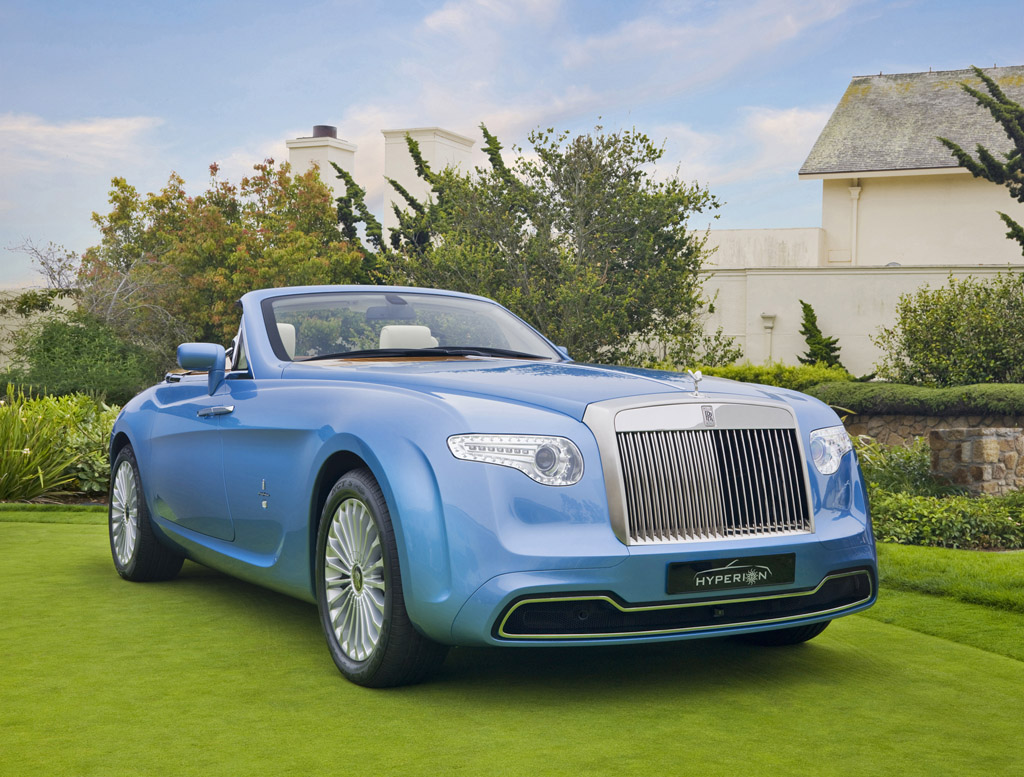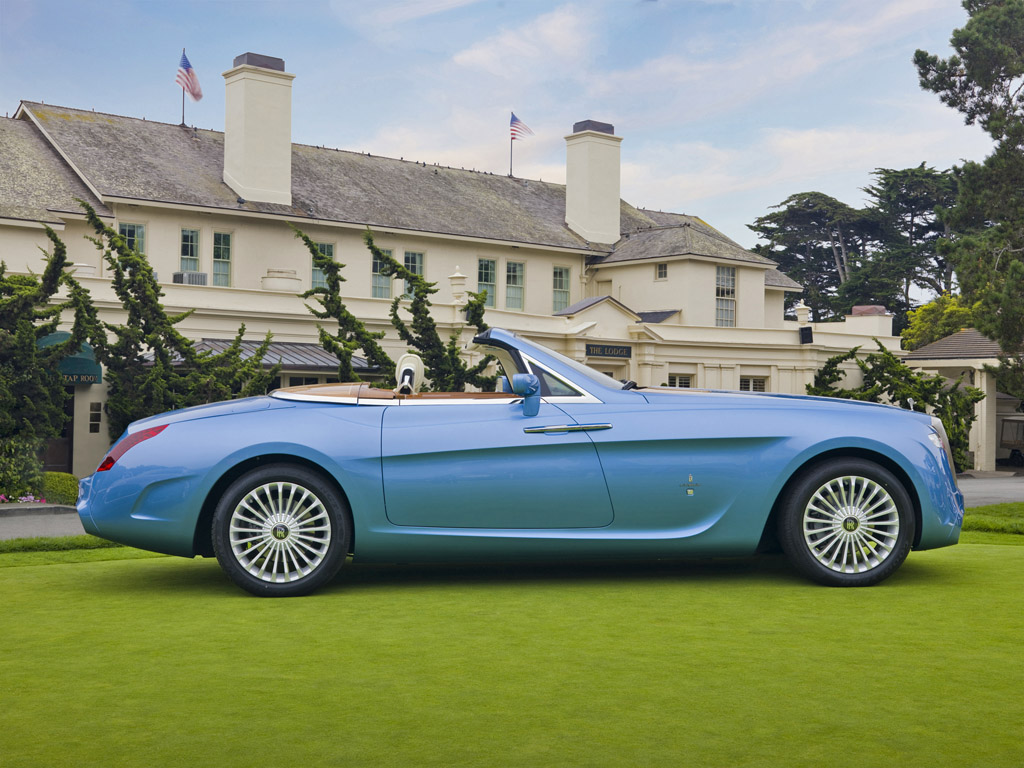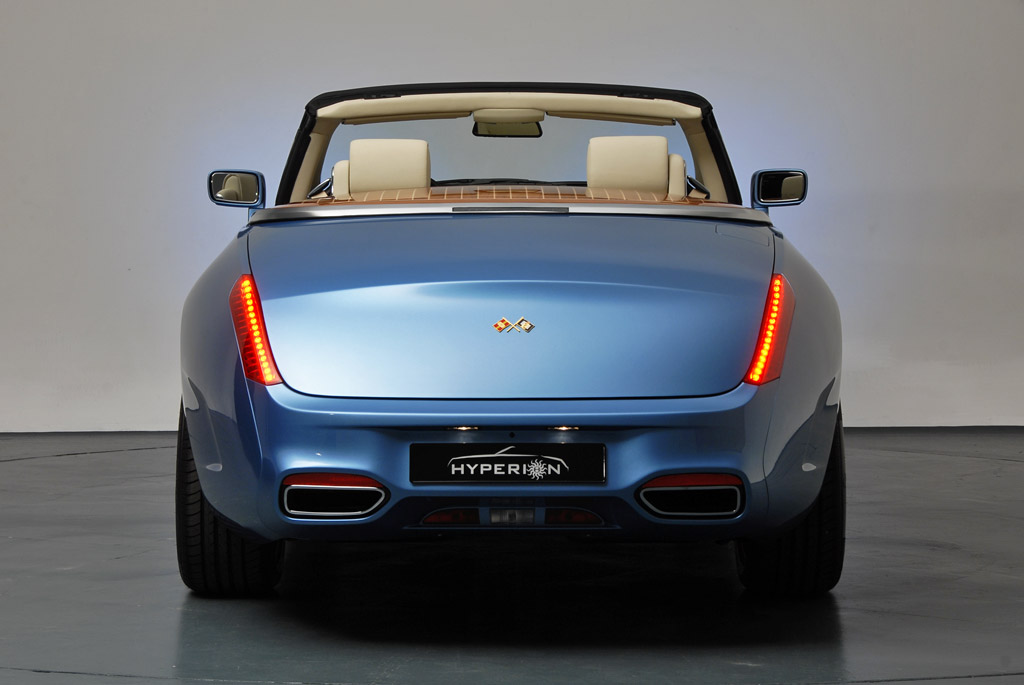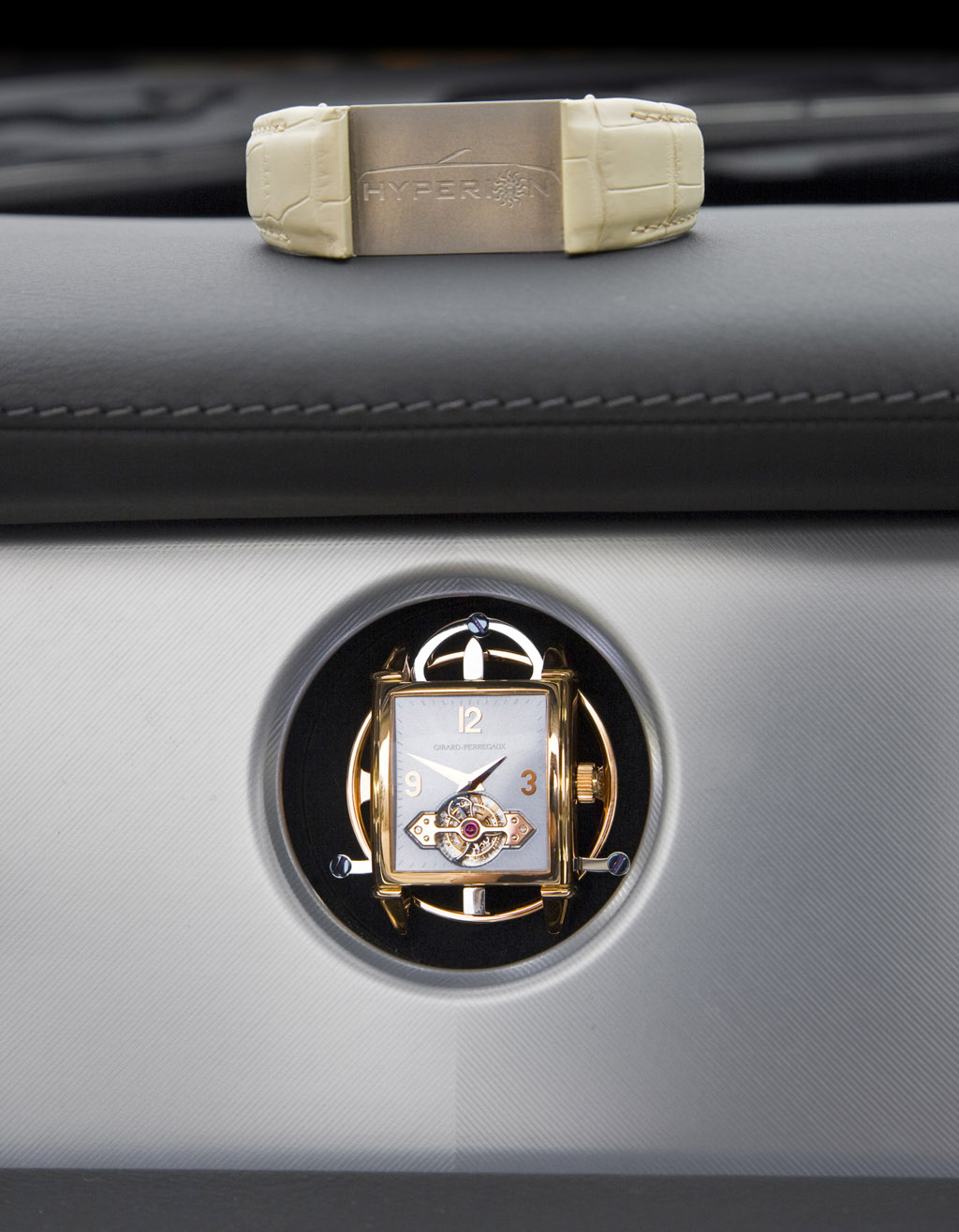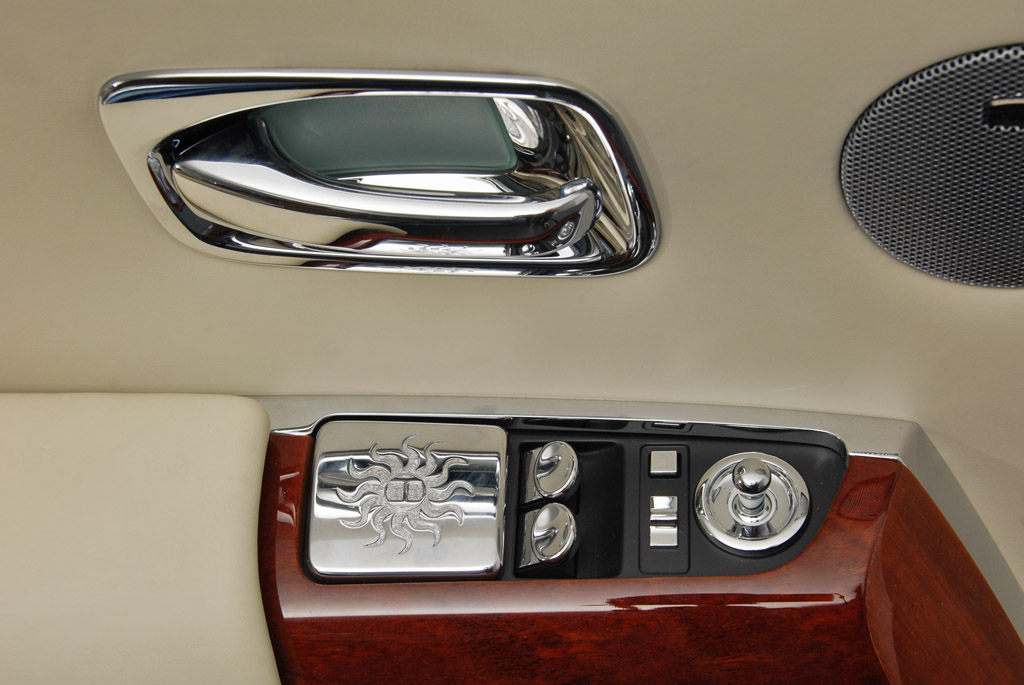2008 Rolls-Royce Pininfarina Hyperion
Pininfarina presents the Hyperion, a one-off custom-built car derived from the Rolls-Royce Drophead Coupe which made its world debut at the Concours d’Elegance at Pebble Beach, America’s most important competition for historical classic and one-off cars and a prestigious annual event.
The car is named after Hyperion, one of the Titans of Greek mythology, to underline its architectural and figurative power.
The car as an artistic expression
It is not the first time that the Pininfarina Special Projects Division has designed a unique car from a standard production model. In the recent past Pininfarina has reinterpreted Ferrari engineering, as in the case of the P4/5 of collector Jim Glickenhaus, or Peter Kalikow’s Scaglietti “K”. In the case of the Pininfarina Hyperion, Roland Hall, a collector and the owner of a Rolls-Royce Drophead Coupe, asked Pininfarina to create a custom-built car that would evoke the appeal of the sumptuous cars of the 1930s. It might seem paradoxical, but today more than ever before, there is a desire on the part of a very elite clientele to return to the idea of the car as an artistic expression. As it was in the 1950s.
With the Hyperion, the team of designers and engineers of the Special Projects Division was able to express its creative skills and to apply Pininfarina expertise without limits, save that of coming as close as possible to the type of car that our customer had in mind. The result was a custom-built unit that is firmly rooted in the values of the Pininfarina and Rolls-Royce brands, with lines and dimensions that are hard to find in a 21st century model. The Hyperion takes up the legacy of other Rolls-Royces designed by Pininfarina, the Silver Dawn saloon of 1951, for example, or the Camargue coupe of 1975.
The concept in brief
The history of Pininfarina offers plenty of examples of special cars built on “noble” bases. Which is why the company naturally welcomed Roland Hall’s proposal to work on a Rolls-Royce floorpan. For the new Pininfarina one-off, however, the Special Projects Division wanted a new idea, something absolutely unique, which only an individual in love with the car as an abstract, and not merely utilitarian, concept could appreciate. And so the Hyperion project was born, in the Autumn of 2007.
In terms of the styling, the first brainwave came when thinking of some of the cars of the 1930s, with their majestic, regal bonnets, and a body that surrounded the driver and a single passenger. Distinctive features of a car which, thanks to its strength and elegance, does not need to move to draw attention to itself.
Like all the cars designed by Pininfarina, the secret of the Hyperion lies in its absolute harmony between masses and volumes, and the perfect balance of every proportion.
The bodywork is made of carbon fibre. Structurally, we moved the driving position further back (400 mm) and took out the rear seats. We designed a new hood, which folds behind the seats under a wood-lined cover. In front of the windscreen we created two compartments for small items or for sports equipment, such as Mr. Hall’s hunting rifles.
The hood cover and the doors of the two compartments were made of solid wood by craftsmen who specialise in creating components for luxury boats. This is another aspect of the programme of Pininfarina special cars: offering customers unique stylistic and technical solutions that are not possible on mass produced cars.
Some of the best international firms contributed to the realisation of the project: Re Fraschini for the carbon, Isoclima for the glazed surfaces, Proxy Design for the drawings of the car, Triom for the lights and headlights, Fondmetal for the wheel rims, and Materialise for components created using fast prototyping, SIGMA Navale Italiana for the finishes in teak.
The styling decisions
Romantic and noble. These two words sum up the styling of the Hyperion. The archetype of the special car, an opulent two-seater roadster that conveys the luxury of the Rolls-Royce Drophead Coupé, from which it derives, at the highest figurative and architectural levels. At the same time, it harks back to the past, and the cars of the pre-war period that now populate the world’s most prestigious concours d’elegance.
To repeat the proportions of those unforgettable cars (a short tail end and majestic bonnet that “surges” forward), we had to extend the roof and shorten the rear end. To balance the volumes, the Pininfarina designers tried to achieve soft, fluidly flowing surfaces. The front sports the classic Rolls-Royce grille, which has been slightly inclined. A trapezoid plane creates a more aerodynamic dashboard, while the recessed Bixenon headlights and LED technology convey sportiness and elegance. The spectacular bonnet is underlined by the muscular, taut wings, while the line that embraces the front wheels is drawn back until it disappears into the hood cover, giving a sense of movement even when the car is stationary. This feature is counterbalanced by a small tooth under the door that runs towards the rear wheel. The shape of the rear end recalls Pininfarina’s legendary sports “berlinettas” of the Fifties and Sixties, with their cut-off tails, strongly inclined downwards, with a flat closure borrowed from boat-building.
The interiors were practically unchanged, maintaining the perfect sense of high luxury in the passenger compartment that distinguished the original car. One precious detail of the instrumentation underlines the unique environment: the watch designed specifically for the Hyperion by Girard-Perregaux, which can be removed from the dash and attached to a bracelet to be worn on the wrist.
Pininfarina and Girard-Perregaux: the emotion of excellence
Combining the excellence of a watch and a car that are out of the ordinary. This was the goal of the collaboration between Pininfarina and luxury Swiss watchmakers Girard-Perregaux. The meeting of two prestigious names that embody artisan tradition and cutting edge technology has created a refined timepiece with a sophisticated mechanism. Girard-Perregaux have personalised one of their sophisticated watches, the Vintage 1945 Tourbillion with gold bridge, for the Hyperion. Thanks to an ingenious anchorage system, this timepiece can be mounted on the car’s dashboard, or removed from its mount to slip on to its owner’s wrist.
The pure lines of the white gold case, inspired by a model of 1945, contain a gold bridge tourbillon. This mechanism, which is faithful to the original design created by Constant Girard-Perregaux in the 19th century, stands out for its complexity: only an expert watchmaker could assemble the cage that weighs just 0.3 grams, carrying no fewer than 72 elements. The automatic movement was painstakingly built by the company.
The Vintage 1945 Tourbillion with gold bridge blends perfectly with the Hyperion, starting from the colours of the face which match those of the bodywork. A sophisticated “spring-ball” system allows it to be extracted from the leather bracelet so that it can be mounted on the dashboard in a support in the shape of a whirlwind, or tourbillon, the hallmark of the Girard-Perregaux brand.
This unique piece suggests the link between the worlds of prestige cars and outstanding watch-making. Cult objects that transcend their function to arouse emotions that are constantly renewed. Pininfarina and Girard-Perregaux: outstanding watches and cars share numerous common denominators: the notion of time, a fundamental factor of motor racing; increasingly refined techniques; and ever-present passion. In these two worlds, admiration for historical models goes hand in hand with the appeal of the most recent performances; the classic design shares the stage with daring concepts; cutting-edge technologies and noble materials are the key words of every successful innovation.
High standards of quality, beauty, power and perfection even in the smallest detail, are essential components.
Girard-Perregaux bases its relationship with Pininfarina on a common conceptual approach, underpinned by a striving for excellence, emotions and beauty. And when passion encounters technical capabilities, the dream takes shape, producing the most refined mechanical structures.
In Detail
| type | Series Production Car |
| released at | 2008 Pebble Beach Concours |
| body stylist | Jason Castriota |
| engine | 60 Degree V12 |
| position | Front, Longitudinal |
| fuel feed | Direct injection |
| displacement | 6749 cc / 411.85 in³ |
| bore | 84.6 mm / 3.3 in |
| stroke | 92 mm / 3.6 in |
| compression | 11.0:1 |
| power | 337.8 kw / 453 bhp @ 5350 rpm |
| specific output | 67.12 bhp per litre |
| torque | 719.9 nm / 531 ft lbs @ 3500 rpm |
| driven wheels | RWD |


